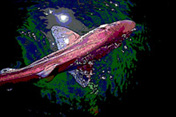IntroductionIn the wildest west, there were really only a few "dangerous" animals, and, of these, only one was sure to attack people on sight: the grizzly bear. With the last of these brown bears shot in California over a century ago, humans needed to fear only ticks with Lyme Disease and rattlesnakes with venom, it seemed. Who would believe at the end of the 20th Century the last great predator in the west is not only present, but flourishing?
Fear and fascination with great white sharks are quite real and deserved. Nobody wants to be on the wrong end of a toothy 20-foot shark. Beyond this, there is always fascination with the dangerous and the beautiful. Video footage from a video camera attached to the back of a shark in a recent documentary [approximately 1995] at the Farallone Islands reveals their enormous grace and surprising cunning. With the populations of pinnipeds along our coast restored, especially elephant seals, we can expect to have great white neighbors for some time to come, perhaps even increasing numbers of them. Who knows if there
are more now, or if there are only more people in the water now. Though great whites favor coastal regions where there are more marine mammals, they likely travel ocean-wide. Nobody has any idea how many there may be. With all our information webworks, with our extent to the moon, the Earth's oceans still offer continuing surprise. I figured sooner or later somebody would set out to do what Mad Jack and Third Eye have embarked on: to catch a live great white and sell it to an aquarium. The great whites that have appeared in regional aquariums have been caught by commercial fishermen accidentally. It was only a matter of time before somebody set out to do it on purpose. I first serialized Mad Jack and the Great White in my magazine, Under the Wharf, spanning ten issues or so through 1993 and '94. Like Mad Jack, who begins bargaining for the sale of his catch before he really caught it, I started publishing the story before I really finished it. In the last issues, I usually typed in the columns of the formatted magazine pages just before I was going to carry the finished thing next day to an advertiser in order to collect. Writing, like fishing, can be great fun. There is a certain strategy and ordering to it in the beginning until the story or the fishing takes over by itself. The whole thing was generally in my head a year so before I started it, but the hardest thing to do, sometimes, is to sit down.
Michael Harris— Santa Cruz , 9/1995
 Mad
Jack and the Great White
Mad
Jack and the Great Whitec